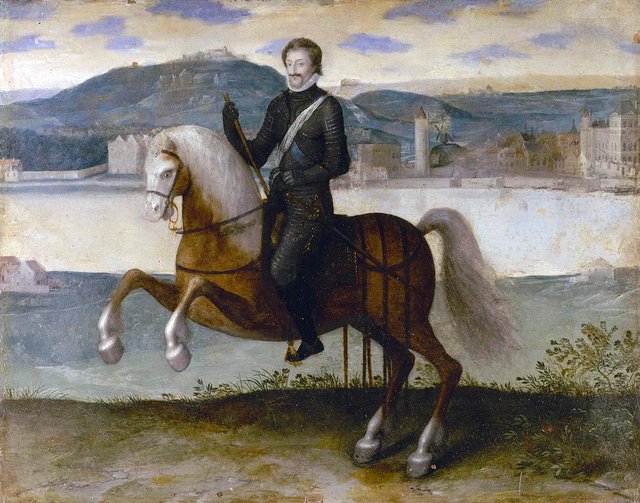Scaliger in the Wilderness

The publication of De Emendatione Temporum in 1583 marked an important watershed in the life of Joseph Juste Scaliger. The fragile Treaty of Fleix, which had brought France’s Seventh War of Religion to an end, collapsed when Henry III’s younger brother and heir presumptive the Duke of Anjou died in 1584. This left the Calvinist Prince Henry of Navarre as the new heir presumptive. When it became clear that Henry had no intention of renouncing his Protestantism, Henry of Lorraine, the leader of the Catholic League, compelled the king to issue the Treaty of Nemours, outlawing Protestantism and annulling Henry of Navarre’s right to the throne. The result was the Eighth War of Religion, known as the War of the Three Henrys, which raged for four years.
In 1588 Henry of Lorraine was assassinated, and the following year Henry III himself fell to the assassin’s blade. This brought the Eighth War to an end but Henry of Navarre, now Henry IV of France, spent the following four years securing his throne. By 1593, when he finally renounced his Protestantism, the Wars of Religion were all but concluded. The Edict of Nantes, which he issued in 1598 and which granted religious toleration to the Huguenots, brought to a close this troubled period of French history.
Scaliger’s career was adversely affected by these events:
Between 1583 and 1593 Scaliger’s life changed for the worse ... The Catholic League drove most of his close friends in the Parlement out of Paris ... The assassinations of 1588 further polluted the poisoned air of French politics. And Scaliger himself, though safe enough as a member of the Rocheposay household, found himself confined in one small château after another, mostly around Poitiers in the west. Now he really was a prisoner in Arabia deserta. The constant threats of attack and need to move prevented him from engaging in serious study. He saw no hope of regaining peace of mind, freedom to travel, or even access to his own library. (Grafton 361)

Scaliger began to revise De Emendatione Temporum almost as soon as it was finished. Throughout 1583 and 1584 he entered new ideas as they occurred to him into his working copy of the text. Fifteen years would elapse, however, before the second edition passed through the printing press. Other than this the only works he produced during these years in the wilderness were slight. Among these were the Metrical Greek Proverbs, which were later published in Paris:
He compiled a long alphabetized set of metrical proverbs in Greek ... and sent it off to Dupuy as a gift in July 1586. (Grafton 366)
His friend and correspondent the Parisian jurist Claude Dupuy was also the beneficiary of another minor work:
Also in 1586 he drew up, again for Dupuy, a long critique of Jacques Davy du Perron’s celebrated funeral oration on Ronsard, the friend of Scaliger’s youth. (Grafton 366)
Scaliger’s life would not be complete without some public controversy to keep him busy. In 1583 the Tuscan scholar Roberto Titi published a collection of Loci Controversi [Controversial Passages], in which he criticized several contemporary scholars: Scaliger, Adrien Turnèbe, Marc Antoine Muret, Piero Vettori, Willem Canter, Politian, Denis Lambin, Carolus Sigonius, Melchior Wieland, Francesco Luigini, François Hotman, among others.

Claude Dupuy apprised Scaliger of the work’s existence in the autumn of 1585. Scaliger read the work with astonishment, took offence, and declared Titi an ass. His response was a pseudonymous pamphlet which he ascribed to a Breton scholar called Yvo Villiomarus. In this polemic Scaliger took it upon himself to defend French letters—us Transalpines—against Italian chauvinism, though Titi had not restricted his criticisms to foreign scholars.
This curious invective marks a sort of postscript to Scaliger’s earlier career as a philologist of Latin classics:
If the cutting edge of Scaliger’s invective was anti-Italian, the body of the work was distinctly harder to classify. Yvo defended both Scaliger’s early master Muret, to whose method he had turned back in the Manilius of 1579, and his more distant—and temporary—Italian masters Vettori and Poliziano, whom he had defended in the Catullus of 1577. He thus really spoke not for a single northern tradition in philology but for Scaliger’s earlier intellectual itinerary as a whole. The nationalist comments at the beginning and end of Yvo’s libellus, which stuck like burrs in the memories of otherwise sympathetic Italian readers, in fact misrepresented the tenor and content of the body of the work. No wonder, then, that Scaliger undertook no new editions of Latin classics during the years of his wilderness. He had lost not skill but direction. He lacked a clear tradition to cling to and defend. Worse still, he lacked a clear sense of what kind of philologist he was, or what his past had actually meant. He could defend the details of his earlier work, but he saw no clear way forward along any of the paths he had travelled in the 1570s. (Grafton 371-372)
Titi replied to Scaliger’s attack with a rebuttal that was published in Florence in 1589, but Scaliger did not deign to reenter the lists, and the controversy died down.

Little did Scaliger know it at the time but the circumstances of his life were about to change for the better. Central to this alteration was the Flemish scholar Justus Lipsius. Like Scaliger, Lipsius had been raised a Catholic but had come to embrace Protestantism. In 1579 he was appointed Professor of History at the University of Leiden, which had been recently founded by William the Silent, Prince of Orange, as a Protestant seat of learning. There he spent eleven productive years which saw the publication of critical editions of the works of Seneca and Tacitus. In 1588 he brought out a corpus of ancient inscriptions:
Later in the 1580s and the 1590s Scaliger seethed and worried, imprisoned at Abain and Preuilly. He wished that all his friends could find safety outside Paris’ ‛la grande Babylone’. He examined the corpus of ancient inscriptions published by Justus Lipsius in 1588 and formed the plan to replace it with a new one: ‛I shall work on it piano piano’, he wrote to Dupuy, ‛and when it is done I shall send it to you, organized by categories, in the right way.’ (Grafton 372 : Larroque 286)

In 1591 Lipsius left Leiden—ostensibly for reasons of health, but in reality to rejoin the Catholic fold. This left a vacancy in the faculty, which the administrators were anxious to fill with a Protestant scholar of international repute:
Janus Dousa—himself a Dorat-trained textual critic and Neo-Latin poet—was the architect of the new university, which had been founded only in 1575. He saw Scaliger as the only successor of lustre sufficient to make up for the loss of Lipsius. Scaliger at first refused the offer of a chair, insisting that he had no desire to leave the French ship of state as it sank and suggesting that Leiden offer the post to Passerat in his place. (Grafton 372-373)
When it became clear that Scaliger found Leiden attractive but was reluctant to teach, the authorities at the University altered their offer, inviting Scaliger to come and study at Leiden but without any obligation to lecture. He accepted. His patron and friend of thirty years Louis Chasteigner de la Roche-Posay, Baron de Malval, Seigneur d’Abain, was still alive at the time—he would not die until 1595—but did not stand in his way. In the summer of 1593 Scaliger moved to Leiden, which would be his home for the remaining sixteen years of his life.

References
- Jacob Bernays, Joseph Justus Scaliger, Wilhelm Hertz, Berlin (1855)
- Anthony Grafton, Joseph Scaliger: A Study in the History of Classical Scholarship, Volume 2, Historical Chronology, Clarendon Press, Oxford (1993)
- Philippe Tamizey de Larroque (editor), Lettres Françaises Inédites de Joseph Scaliger, Alphonse Picard, Paris (1884)
- Joseph Juste Scaliger, Yvo Villiomarus of Brittany, Criticisms of Roberto Titi’s Loci Controversi, Mamert Patisson, Paris (1586)
- Joseph Juste Scaliger, Παροιμιαι Ἐμμετροι: Proverbs in Greek Verse, Fédéric Morel, Paris (1593, 1594)
- Roberto Titi, Locorum controversorum libri decem, Bartolomeo Sermartelli, Florence (1583)
- Roberto Titi, Pro Suis Locis Controversis Assertio adversus Yvonem Quemdam Villiomarum Italici Nominis Calumniatorem, Bartolomeo Sermartelli, Florence (1589)
Image Credits
- Henry IV of France before Paris: Anonymous Portrait, Musée Carnavalet, Paris, Public Domain
- Château d’Abain, Thurageau: © jm.durand (photographer), Creative Commons License
- Justus Lipsius: Peter Paul Rubens (artist), After Abraham Janssens I (artist), Museum Plantin-Moretus, Antwerp, Public Domain
- Château des Lions de Preuilly-sur-Claise: Musée de la Poterne, Former Entrance of the Château des Lions, Preuilly-sur-Claise, © DoucF (photographer), Creative Commons License
- Leiden University in 1614: Jacob Marci & Justum a Colster, Illustrium Hollandiae & Westfrisiae Ordinum Alma Academia Leidensis, Leiden (1614), Public Domain
